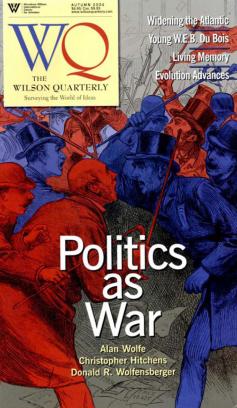Politics as War


America's youth are reading less...or at least not reading the right stuff.
Having military brass dabble in politics can make for a volatile mix.
What if Aaron Burr had missed?
Sure, politicians shouldn't make promises they'll never keep. But citizens shouldn't ask more from them than they can provide.
We've all gotten used to terror threat levels, but are we really preparing for the right things?
Military service is supposed to create better citizens, but it doesn't always work out that way.
Further salvos in the war of words between neoconservatives Charles Krauthammer and Francis Fukuyama.
Football stadiums may not make economic sense for cities, but they do bring something often overlooked: pleasure.
Health care needs a major fix, so much so that it's hard to know where to begin.
Experts continue to struggle with ways to close the black-white test score gap.
Vacationing has an interesting history in America, with the automobile, better paychecks, and more leisure time all creating one of the largest growth industries.
In the mid-1980s, a lot of women were choosing to keep their own names when they married, but that number has declined sharply.
Japanese readers searching for the elusive honne, or truthful, stories about their government are increasingly turning to tabloid-style newsweeklies.
Ben Bagdikian is back with another assessment of who controls the news, but at least one critic thinks he has it wrong.
Jawaharlal Nehru steered clear of religion in his personal life, but his political life was guided by a deeply held moral sensibility.
"Progress is an illusion," argues one European philosopher. It's a view that "answers to the needs of the heart, not reason."
Getting clocks to keep the same time proved to be a tremendous hurdle to progress in early 20th-century England.
"Virgin" rainforests? It seems people have been tampering with them a lot longer than previously thought.
Bright lights? Strange floating figures? The jury's still out on an afterlife, but at least some reported phenomena seem to have natural explanations.
There are all kinds of reasons for America's obesity problem, but the most likely culprits lie in uncomfortable areas.
Has intellectual life lost its "urgent core," as one critic suggests, or, as another says, are we merely seeing "the democratization of criticism"?
During a time that some called the Age of Conformity, one magazine lampooned even the most sacred topics.
Results of term limits on state legislators may be encouraging to supporters.
Public radio is trading music for news in pursuit of listeners (and ad revenues), but it was supposed to be immune from such pressures.
Turkey under Atatürk offered an appealing model for the Muslim world, in the view of U.S. officials, but its more recent independence on important internal issues may provide a more useful model.
China is undergoing an unexpected artistic renaissance, with wary support from the government.
One surprising obstacle to the entry of former communist-bloc countries to the EU: the role and power of organized labor.
ATHENS:
A History, from Ancient
Ideal to Modern City.
By Robin Waterfield. Basic.
CATCH AND RELEASE:
Trout Fishing and the Meaning of Life.
By Mark Kingwell. Viking.
CITIES OF WORDS:
Pedagogical Letters on a Register of the Moral Life.
By Stanley Cavell
COPIES IN SECONDS:
How a Lone Inventor and an
Unknown Company Created the Biggest Communication Breakthrough since Gutenberg—Chester Carlson and the Birth of the Xerox Machine.
By David Owen.
FAT MAN FED UP:
How American Politics Went Bad.
By Jack Germond.
FINAL SOLUTIONS:
Mass Killing and Genocide
in the 20th Century.
By Benjamin A. Valentino.
Robert Masello on science fiction writer Philip K. Dick
KAFKA:
A Biography.
By Nicholas Murray.
LIBERIA: Portrait of a Failed State.
By John-Peter Pham.
LOOKING FOR LONGLEAF:
The Fall and Rise of an
American Forest.
By Lawrence S. Earley
NEW POLITICAL RELIGIONS,
or An Analysis of Modern Terrorism.
By Barry Cooper
Phyllis Rose on the art of the essay
THE NUREMBERG INTERVIEWS:
An American Psychiatrist’s
Conversations with the
Defendants and Witnesses.
By Leon Goldensohn
WELLINGTON’S RIFLES:
Six Years to Waterloo with England’s Legendary Sharpshooters.
By Mark Urban
WHEN GERMS TRAVEL: ...
The election of 2004 suggested much bad blood between the two parties, but questions remain about how polarized the electorate really is.
Mud-slinging in politics is a time-honored American tradition. But is there anything so bad about throwing a few political barbs?
Partisan bickering has become the rule on Capitol Hill, but once--and not all that long ago--debate and compromise got things done.
From the sudden spread of West Nile virus in the United States to the discovery that Galápagos Island finches are evolving by unexpected means, there are signs that the natural world does not function quite as we thought. A variety of scientific findings now point to the need for a radically revised understanding of the way evolution itself works.
Long after the last witnesses to momentous events in the history of a nation have died, the memory of those events may continue to alter the course of the nation. What matters most is not whether historical recollection is accurate, but whether it liberates or imprisons.
The new United States of Europe has more people, more wealth, and more tradethan the United States of America. Yet Americans have largely ignored the change in Europe. They do so at some risk, for Europe’s goal is to rival and surpass America—and one of the powerful motives urging Europeans toward that goal is the disdain many of them now share for America.
Booker T. Washington and W. E. B. Du Bois were pioneers in the quest for African-American equality in America. They were also bitter rivals. What’s sometimes overlooked is that their years of public confrontation were preceded by a decade of cautious mutual regard.